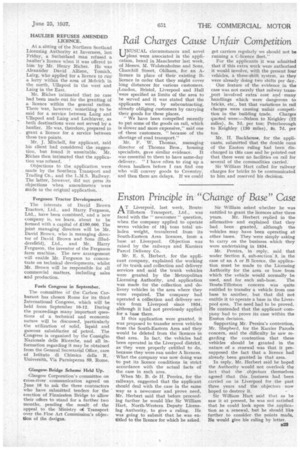Elston Principle in 'Change of Base" Case A T LiverpoOl,
Page 37

If you've noticed an error in this article please click here to report it so we can fix it.
last week, BoutsPI Tillotson Transport, Ltd., was faced with the •' newcomer" question, when the company applied to operate seven vehicles of 184 tons total unladen weight, transferred from its South-Eastern Area licences, from a base at Liverpool. Objection was raised by the railways and Karriers Parcel Delivery Co.
Mr. E. S. Herbert, for the applicant company, explained the working of its trunk and collection and delivery services and said the trunk vehicles were granted by the Metropolitan Licensing Authority, and application was made for the collection and delivery vehicles in the area where they were required. The company had operated a collection and delivery service from Liverpool since 1934, although it had not previously applied for a base there.
If this application were granted, it was proposed to transfer seven vehicles from the South-Eastern Area and they would be deleted from the licences in that area. In fact, the vehicles had been operated in the Liverpool district, as they were properly entitled to do, because they were run under A licences. What the company was now doing was to put its licence conditions in strict accordance with the actual facts of the case in each area.
When Mr. B. de H. Pereira, for the railways, suggested that the applicant should deal with the case in the same way as a newcomer and prove need, Mr. Herbert said that before proceeding further he would like Sir William Hart, North-Western Deputy Licensing Authority, to give a ruling. He was going to submit that he was entitled to the licence for which he asked. Sir William asked whether he was entitled to grant the licences after three years. Mr. Herbert replied in the affirmativeand explained that they had been granted, although the 'vehicles may have been operating at other bases. They were simply asking to carry on the business which they were undertaking in 1934.
Mr. Pereira, in reply, said that under Section 5, sub-section' 3, in the case of an A or B licence, the application must he made to the Licensing Authority for the area or base from which the vehicle would normally be
used, and for each sub-base. The Bouts-Tillotson concern was quite entitled to transfer a vehicle from one base to anbther, but that did not entitle it to operate a base in the Liverpool area. The need had to be proved. He contended that the applicant company had to prove its case within the Enston decision.
Supporting Mr. Pereira's contention. Mr. Shepherd, for the Karrier Parcels concern, said the difficulty he saw regarding the contention that these vehicles should be granted in the nature of a renewal was that it presupposed the fact that a licence had already been granted in that area.
In reply, Mr. Herbert said he hoped the Authority would not overlook the fact that the objectors themselves agreed that this business had been carried on in Liverpool for the past three years and the objectors now hoped to destroy it. Sir William Hart said that as be saw it at present, 'he was not satisfied that he could look upon the application as a renewal, but he should like further to consider the points made. He would give his ruling by letter.




























































































